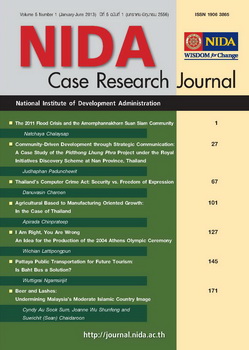Beer and Lashes: Undermining Malaysia’s Moderate Islamic Country Image
Keywords:
International Public Relations, Strategic Communication, Public DiplomacyAbstract
On 20 July 2009, Kartika Sari Dewi Shukarno, a Malaysian Muslim model, became the f irst woman to be sentenced for caning under the Malaysian Islamic Syariah law (or the Shariah High Courts as it’s known internationally). She was caught drinking beer at a nightclub in the state of Pahang and the Syariah court subsequently ordered that she be sentenced to a fine (which she paid) and 6 strokes of the cane. Against precedents and against expectations, Kartika refused to appeal her caning sentence, becoming the first woman in Malaysia slated to be caned.The government which is led by the conservative Islamic party is heavily influenced by the teachings of Islam, leading to the formation of a very unique dual judicial system in the Kingdom of Malaysia: The Civil laws and the Syariah laws. The government places great pride and confidence particularly in the constitution of the Syariah laws to uphold the values of Islam, one of which is the incontestable prohibition of alcohol consumption by practicing Muslims residing in Malaysia.
A much less severe form of caning can be ordered by Syariah courts. Unlike judicial caning, Syariah caning may be ordered for women as well as men, but only for Muslims, including non-Malaysians. In Kartika’s case, she was deemed to have violated the Islamic law of alcohol abstinence, hence as a deterrent and a warning message to other practicing Muslims, the courts decided that she would be rightfully punished but what they did not expect was the overwhelming furore that erupted from the international communities and human rights watchdogs.
This case, therefore, aims to achieve three main objectives. First, it demonstrates communication challenges faced by the Malaysian government as the country attempt to brand and promote itself as a self-respecting Muslim nation while maintaining its effort to be a modern cosmopolitan hub for diverse populations. Second, it illustrates the Malaysian government’s dilemma as they faced criticism from conservative Islamic parties, opposition groups, the general public and the international advocacy groups through the case of caning as a punishment for drinking in public. Finally, readers will be asked to propos e effective communication strategies that the government should or could deploy to restore its battered image and reinstate its reputation as a country of free opportunities and fair treatment.
Downloads
How to Cite
Sum, C. A. S., Shunfeng, J. W., & Chaidaroon, S. S. (2014). Beer and Lashes: Undermining Malaysia’s Moderate Islamic Country Image. NIDA Case Research Journal, 5(1), 171–189. retrieved from https://so04.tci-thaijo.org/index.php/NCRJ/article/view/24788
Issue
Section
Case Study





